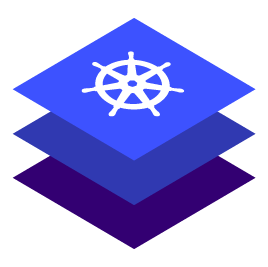dkp create cluster vsphere
Create a Konvoy cluster in vSphere
CODE
dkp create cluster vsphere [flags]Options
CODE
--additional-tags stringToString Tags to apply to the provisioned infrastructure (default [])
--allow-missing-template-keys If true, ignore any errors in templates when a field or map key is missing in the template. Only applies to golang and jsonpath output formats. (default true)
--aws-service-endpoints string Custom AWS service endpoints in a semi-colon separated format: ${SigningRegion1}:${ServiceID1}=${URL},${ServiceID2}=${URL};${SigningRegion2}...
--certificate-renew-interval int The interval number of days Kubernetes managed PKI certificates are renewed. For example, an Interval value of 30 means the certificates will be refreshed every 30 days. A value of 0 disables the feature. (default 0)
-c, --cluster-name name Name used to prefix the cluster and all the created resources.
--control-plane-cpus int The number of virtual processors in a control plane machine (default 4)
--control-plane-disk-size int The size of a control plane machine's disk, in GB (default 80)
--control-plane-endpoint-host string The control plane endpoint address. To use an external load balancer, set to its IP or hostname. To use the built-in virtual IP, set to a static IPv4 address in the Layer 2 network of the control plane machines. [Not for production use: To use a single-machine control plane, set to the IP or hostname of the machine.]
--control-plane-endpoint-port int The control plane endpoint port. To use an external load balancer, set to its listening port. (default 6443)
--control-plane-http-proxy string HTTP proxy for control plane machines
--control-plane-https-proxy string HTTPS proxy for control plane machines
--control-plane-memory int The size of a control plane machine's memory, in GB (default 16)
--control-plane-no-proxy strings No Proxy list for control plane machines (default [])
--control-plane-replicas int Number of control plane replicas (default 3)
--data-center string The vSphere datacenter to deploy the workload cluster on.
--data-store string The vSphere datastore to deploy the workload cluster on.
--dry-run Only print the objects that would be created, without creating them.
--etcd-image-repository string The image repository to use for pulling the etcd image
--etcd-version string The version of etcd to use. Overriding kubeadm's default value as etcd v3.5.x is not recommended for production use. This default value will removed in a future release once etcd is fixed. (default "3.4.13-0")
--extra-sans strings A comma separated list of additional Subject Alternative Names for the API Server signing cert (default [])
--folder string The vSphere folder for your VMs. Set to "" to use the root vSphere folder.
-h, --help help for vsphere
--http-proxy string HTTP proxy for CAPI controllers
--https-proxy string HTTPS proxy for CAPI controllers
--kind-cluster-image string Kind node image for the bootstrap cluster (default "mesosphere/konvoy-bootstrap:v2.3.3")
--kubeconfig string Path to the kubeconfig for the management cluster. If unspecified, default discovery rules apply.
--kubernetes-image-repository string The image repository to use for pulling kubernetes images
--kubernetes-version string Kubernetes version (default "1.23.12")
-n, --namespace string If present, the namespace scope for this CLI request. (default "default")
--network string The vSphere network to deploy the workload cluster on.
--no-proxy strings No Proxy list for CAPI controllers (default [])
-o, --output string Output format. One of: json|yaml|name|go-template|go-template-file|template|templatefile|jsonpath|jsonpath-as-json|jsonpath-file.
--registry-mirror-cacert file CA certificate chain to use while communicating with the registry mirror using TLS
--registry-mirror-password string Password to authenticate to the registry mirror with
--registry-mirror-url string URL of a container registry to use as a mirror in the cluster
--registry-mirror-username string Username to authenticate to the registry mirror with
--resource-pool string The vSphere resource pool for the workload cluster's virtual machines.
--self-managed When set to true, the required prerequisites are created before creating the cluster and the resulting cluster has all necessary components deployed onto itself, so it can manage its own cluster lifecycle. When set to false, a management cluster is used.(default false)
--server string The vCenter server IP or FQDN.
--show-managed-fields If true, keep the managedFields when printing objects in JSON or YAML format.
--ssh-public-key-file string Path to the authorized SSH key for the user
--ssh-username string Name of the user to create on the instance (default "konvoy")
--storage-policy string This is the vSphere storage policy. Set it to "" if you don't want to use a storage policy.
--template string Template string or path to template file to use when -o=go-template, -o=go-template-file. The template format is golang templates [http://golang.org/pkg/text/template/#pkg-overview].
--timeout duration The length of time to wait before giving up. Zero means wait forever. (default 10m0s)
--tls-thumb-print string sha1 thumbprint of the vcenter certificate: openssl x509 -sha1 -fingerprint -in ca.crt -noout
--virtual-ip-interface string The network interface, e.g, 'eth0' or 'ens5', to use for the built-in virtual IP control plane endpoint. This interface must be available on every control plane machine. If the value is empty, the flag does nothing. If the value is not empty, the built-in virtual IP control plane endpoint is created, using values from --control-plane-endpoint-host and --control-plane-endpoint-port.
--vm-template string The virtual machine template to use for the workload cluster's virtual machines.
--wait If true, wait for operations to complete before returning. (default true)
--with-aws-bootstrap-credentials Set true to use AWS bootstrap credentials from your environment. When false, the instance profile of the EC2 instance where the CAPA controller is scheduled on will be used instead.
--with-gcp-bootstrap-credentials Set true to use GCP bootstrap credentials from your environment. When false, the service account of the VM instance where the CAPG controller is scheduled on will be used instead.
--worker-cpus int The number of virtual processors in a worker machine (default 8)
--worker-disk-size int The size of a worker machine's disk, in GB (default 80)
--worker-http-proxy string HTTP proxy for nodes
--worker-https-proxy string HTTPS proxy for nodes
--worker-memory int The size of a worker machine's memory, in GB (default 32)
--worker-no-proxy strings No Proxy list for nodes (default [])
--worker-replicas int Number of workers (default 4)Options inherited from parent commands
CODE
-v, --verbose int Output verbositySEE ALSO
- dkp create cluster - Create a Kubernetes cluster, one of [aks, aws, azure, eks, gcp, preprovisioned, vsphere]
